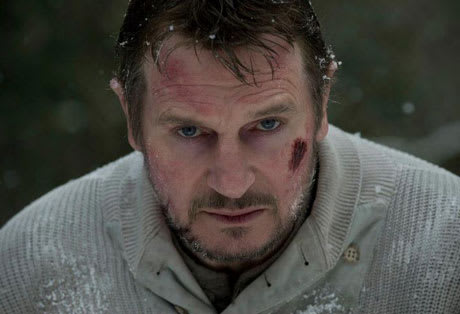Grim and desolate, with a mature honesty seldom seen in survival pictures, The Grey is a moving character drama swaddled in a thrilling adventure. On the surface, the set up references true-cannibalism story Alive and the final third of White Fang: plane crash survivors are hunted by a wolf pack, starving and threatened by the encroachment of outsiders. But The Grey is a contemplative piece on finding the will to fight for life and easing the transition to death by holding fast the loves that make it worth living.
Liam Neeson is at the top of his game as a man haunted by his past, of which we see brief flashes – enough to know it's about his wife, but not the context. Taking an expository shortcut, he lays out the setting – an oil drilling job in Alaska with "ex-cons, fugitives and men unfit for mankind" –and his emotional state (really depressed) in a letter to her in the film's opening.
There may have been a more elegant way to present this scene and information, but after this minor stumble out of the gate, The Grey retains solid footing for the majority of the picture, with an excellent supporting cast of well-developed, flawed personalities.
In what's possibly the most harrowing plane crash sequence I've seen, director Joe Carnahan (Narc, The A-Team) displays excellent editing instincts that put us directly into Neeson's perspective throughout the experience, the abrupt cuts to his unconscious mind making it all the more disorienting.
After gathering survivors and helping a dying man make peace in a very poignant scene that eschews subterfuge or denial for the harsh comfort of truth, Neeson (character names have a small, specific part to play in the drama) emerges as the obvious alpha of the group.
As the small band of battered humans attempt to fend off the wolves aggressively defending the wide "kill radius" around their den, their actions parallel the pack dynamics, with challenges to the alpha nipped as necessary. It's an effective way to depict man's animal nature and call out bullshit posturing tactics rampant in society that amount to nothing in the wild.
The oppressive wind and snow are as much a threat as the wolves, amplified by the smart decision to only have a musical score during emotional conversations or moments of personal reflection. Hearing just the wailing wind, crunching snow underfoot or crackling campfire ratchets up the tension for when a distant howl or snarl in the dark breaks through the subdued din.
Despite minor touches of heavy-handed sentimentality and a forgiving attitude about the realities of hypothermia, The Grey is an uncompromising celebration of relying on one's force of will to find the value of fighting for every moment of life.
(eOne)Liam Neeson is at the top of his game as a man haunted by his past, of which we see brief flashes – enough to know it's about his wife, but not the context. Taking an expository shortcut, he lays out the setting – an oil drilling job in Alaska with "ex-cons, fugitives and men unfit for mankind" –and his emotional state (really depressed) in a letter to her in the film's opening.
There may have been a more elegant way to present this scene and information, but after this minor stumble out of the gate, The Grey retains solid footing for the majority of the picture, with an excellent supporting cast of well-developed, flawed personalities.
In what's possibly the most harrowing plane crash sequence I've seen, director Joe Carnahan (Narc, The A-Team) displays excellent editing instincts that put us directly into Neeson's perspective throughout the experience, the abrupt cuts to his unconscious mind making it all the more disorienting.
After gathering survivors and helping a dying man make peace in a very poignant scene that eschews subterfuge or denial for the harsh comfort of truth, Neeson (character names have a small, specific part to play in the drama) emerges as the obvious alpha of the group.
As the small band of battered humans attempt to fend off the wolves aggressively defending the wide "kill radius" around their den, their actions parallel the pack dynamics, with challenges to the alpha nipped as necessary. It's an effective way to depict man's animal nature and call out bullshit posturing tactics rampant in society that amount to nothing in the wild.
The oppressive wind and snow are as much a threat as the wolves, amplified by the smart decision to only have a musical score during emotional conversations or moments of personal reflection. Hearing just the wailing wind, crunching snow underfoot or crackling campfire ratchets up the tension for when a distant howl or snarl in the dark breaks through the subdued din.
Despite minor touches of heavy-handed sentimentality and a forgiving attitude about the realities of hypothermia, The Grey is an uncompromising celebration of relying on one's force of will to find the value of fighting for every moment of life.
